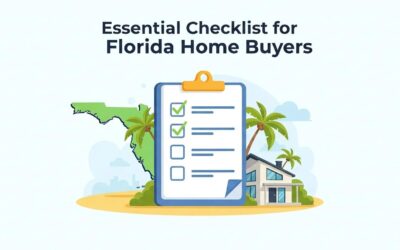Making the move from renting to owning in Florida takes planning, but it’s worth it! With the median home price around $405,000, understanding the market is key. Start by checking your finances—ensure your credit score is firm and set a budget for your down payment and monthly costs.
Many buyers put down as little as 3-5%, but first-time homebuyer programs like FHA and VA loans can help lower that amount. Exploring different mortgage options is essential—fixed-rate mortgages provide steady payments, while adjustable-rate mortgages might start lower but change over time. Knowing what you qualify for allows you to move quickly when you find the right home.
Many people successfully transition from renting to owning with the proper support. A Tampa couple saved for two years, used a first-time homebuyer program, and purchased a home with just 3.5% down! With thoughtful planning and the right team, you can do it, too—owning a home in Florida is possible, and real estate brokers are here to help!
Key Takeaways
- Calculate your budget, including down payments, closing costs, and ongoing monthly expenses, to assess your financial readiness.
- To secure better mortgage rates, improve your credit score by making timely payments, reducing debt, and avoiding new credit inquiries.
- Explore various mortgage options, such as FHA, VA, or USDA loans, that suit your financial situation and homeownership goals.
- Collaborate with local real estate agents to identify properties and analyze market trends for informed home-buying decisions.
- Complete necessary due diligence, including inspections and negotiations, before finalizing the purchase and securing title insurance for protection.
Understanding the First Time Home Buyer Options
If you’ve been dreaming of homeownership in Sarasota, Bradenton, or Palm Beach, now is the time to make it happen! The Florida housing market is evolving, with more homes available and fantastic programs explicitly designed for first-time buyers. Many people think buying a home is out of reach, but there are incredible assistance options that can help you get the keys to your dream home faster than you ever imagined!
Florida offers a wide range of programs that provide down payment assistance, lower interest rates, and reduced mortgage insurance costs. Whether you’re looking at a charming coastal home in Sarasota, a vibrant community in Bradenton, or the luxury lifestyle of Palm Beach, there are state and local programs ready to help. FHA, VA, and USDA loans open doors for buyers with little to no down payment, and Florida’s First-Time Homebuyer Program makes ownership even more accessible.
Here’s the best part—I work with top financing experts who seem to work miracles when it comes to securing the best options for buyers. If you’re ready to stop renting and start owning, let’s connect! I’ll put you in touch with the right people and help you find your perfect home in one of Florida’s most desirable areas.
Assessing Your Financial Readiness
How can potential buyers effectively gauge their financial readiness for purchasing a home in Florida? Evaluating one’s financial position is crucial before diving into the housing market. Key factors include understanding the budget for homeownership, loan options, market dynamics, extra costs, and available assistance programs.
| Financial Aspect | Details | Considerations |
|---|---|---|
| Budgeting | Median home price: $405,000 | Closing costs: 2-5% of purchase price |
| Loan Options | Down payment: 0% to 3.5% depending on the loan type | Assistance programs available |
| Market Dynamics | Increased inventory and longer market times | Potential for negotiations with sellers |
| Extra Costs | Flood insurance, property taxes, HOA fees | Understanding ongoing expenses |
Additionally, potential buyers should explore first-time homebuyer programs available in Florida that can help ease the financial burden of purchasing a home. Understanding the importance of mortgage preapproval can also help buyers set a realistic budget and strengthen their offers when they find a property they like.
Improving Your Credit Score

Improving a credit score is a vital step for people moving from renting to homeownership in Florida. A higher credit score boosts borrowing potential and favorable mortgage terms. Timely bill payments and managing credit utilization are fundamental; keeping balances low and requesting higher credit limits can significantly impact scores.
Furthermore, becoming an authorized user on a responsible person’s account or utilizing secured credit cards can assist in building credit. Increasing credit limits allows individuals to lower their overall credit utilization, which can lead to a better credit score over time.
Additionally, understanding credit score ranges can help individuals set realistic goals for improvement. Rent reporting through services like Experian’s RentBureau allows timely rent payments to contribute positively to credit histories. Avoiding new credit inquiries and addressing any debts in collections will further strengthen a credit profile, ultimately paving the way for a smoother shift into homeownership and fostering a sense of belonging in a new community.
Setting a Realistic Budget
Achieving homeownership in Florida requires a strong credit score and a well-thought-out budget. Prospective buyers must consider both initial and ongoing costs to avoid financial strain. A practical budget encompasses down payments, closing costs, and monthly expenses such as mortgage payments, property taxes, and insurance.
Given the current market dynamics, buyers must be aware of the strong demand for Florida real estate, which may affect pricing and availability. Understanding the average down payment for first-time buyers (approximately 7% in 2021) is essential for setting a realistic financial plan.
| Cost Type | Estimated Range |
|---|---|
| Down Payment | 5-20% (Domestic), ~25% (Foreign) |
| Closing Costs | 1-5% of home price |
| Monthly Expenses | Varies (mortgage, taxes, insurance) |
Understanding these elements enables buyers to assess their financial readiness and investigate homes within their means, fostering a sense of security and belonging in their new community.
Exploring Mortgage Options

Understanding the different mortgage options is vital to securing a Florida dream home. Other types of loans, such as conventional, FHA, and tailored programs like VA and USDA, cater to a range of financial situations and needs. Furthermore, interest rates significantly impact general affordability, making it necessary for potential buyers to investigate government loan programs that may provide favorable terms.
Notably, the estimated conforming loan limit for most of Florida in 2025 is set at $750,000, which can significantly influence mortgage eligibility. Additionally, obtaining preapproval can enhance a buyer’s credibility in the competitive housing market.
Types of Mortgages
Navigating through the landscape of mortgage options is vital for prospective homebuyers in Florida, significantly as varied financing choices can dramatically influence long-term affordability and investment potential. The primary types of mortgages include Conventional loans, which often require a minimum credit score of 620 and a 3% down payment, making them accessible for many buyers. FHA loans cater to those with lower credit scores, allowing a 3.5% down payment.
VA loans offer unique benefits for veterans, including 0% down and no PMI. USDA loans also feature 0% down but are focused on rural locations. Each mortgage type has separate advantages, enabling buyers to find a suitable path towards homeownership that aligns with their financial situation and aspirations.
Understanding conforming loan limits is also crucial, as they determine the maximum loan amounts Fannie Mae and Freddie Mac will purchase, influencing the mortgage options available to buyers.
Interest Rates Impact
How do fluctuations in interest rates affect homebuyers in Florida? These variations notably influence mortgage costs, ultimately shaping the accessibility of homeownership. As of March 2025, Florida’s 30-year fixed mortgage rates have recently declined to 6.63%, offering a more favorable environment for buyers compared to the historical highs of the 1980s.
However, regional disparities persist, with rates in high-demand areas like Miami exceeding national averages. Experts predict potential stabilization around 5.5% to 6% if inflation decreases, but uncertainty looms. Buyers should consider the implications of these rates on monthly payments and long-term financial commitments.
By understanding these trends, prospective homeowners can make informed decisions, fostering a sense of belonging in their communities. Additionally, current mortgage rates are influenced by various economic factors, including inflation and Federal Reserve actions, which can further impact buyers’ financial planning.
Government Loan Programs
Exploring the landscape of mortgage options in Florida reveals a variety of government loan programs designed to facilitate homeownership for diverse groups. These programs cater to initial-time buyers, veterans, and those in rural areas, offering accessible pathways to owning a home.
- FHA Loans: Require as little as 3.5% down and have flexible credit score requirements, making them ideal for competitive markets.
- VA Loans: Offer 0% down payment for eligible veterans and lower fees, providing significant savings.
- USDA Loans: Target rural areas with 0% down and income-based eligibility, promoting community growth.
Navigating the Home Buying Process

Steering through the home buying process in Florida requires a tactical method, as prospective buyers must consider different financial, logistical, and legal elements to secure their ideal property.
| Key Steps | Considerations |
|---|---|
| Financial Preparation | Maintain a 700+ credit score; aim for 20% down payment |
| Home Search Strategy | Collaborate with local agents; analyze market trends |
| Due Diligence | Conduct inspections; negotiate repairs |
| Financing Options | Compare mortgage types; utilize down payment assistance |
| Closing Process | Understand title transfers; investigate remote closing options |
Additionally, ensuring a solid emergency fund can help cover unforeseen expenses after purchasing your home.
Tips for First-Time Homebuyers
Initial-time homebuyers in Florida must prioritize financial readiness, as understanding credit scores and debt-to-income ratios is essential for loan qualification. Moreover, awareness of current market trends, including median home prices and the demand for energy-efficient properties, can inform better purchasing decisions. Ultimately, exploring different mortgage options, including down payment assistance programs, can significantly ease the financial burden associated with homeownership.
Additionally, being aware of the Florida housing market will help buyers make informed choices in their home search.
Assess Financial Readiness
Evaluating financial readiness is a crucial step for prospective homebuyers in Florida, as it lays the groundwork for a successful and sustainable home purchase. To guarantee preparedness, applicants should focus on the following key areas:
- Credit Score Optimization
- Check credit reports for errors
- Pay down existing debts
- Maintain a score above 700
- Avoid new credit inquiries
- Address discrepancies promptly
- Budgeting for Homeownership Costs
- Estimate monthly mortgage payments
- Allocate funds for closing costs
- Budget for insurance and taxes
- Plan for maintenance expenses
- Factor in potential PMI
- Down Payment Strategies
- investigate different loan options
- Research down payment assistance programs
- Save consistently towards the down payment
- Understand the impact of loan types
- Prepare for supplementary upfront costs
Understand Market Trends
How can understanding market trends enable novice homebuyers in Florida? By grasping the current dynamics, buyers can navigate their expedition more effectively. Florida’s housing market is shifting towards a buyer’s market, specifically for condos and townhouses, which may offer more favorable pricing.
Increased inventory and a notable rise in active listings suggest opportunities for negotiation. Regions like the I-4 Corridor are thriving due to affordability, attracting diverse demographics. However, buyers must remain cautious of heightened mortgage rates and insurance costs that challenge affordability.
By staying informed about these trends, novice buyers can better position themselves to make educated decisions and ensure they find a community that feels like home in this vibrant state.
Explore Mortgage Options
Maneuvering the myriad of mortgage options available can be intimidating for novice homebuyers in Florida. Understanding the differences between various loan types is essential for making informed decisions.
- Conforming Loans: These loans have limits starting at $750,000 and offer favorable interest rates and flexibility for multi-unit properties.
- FHA Loans: With lower credit requirements, FHA loans facilitate homeownership for many, allowing down payments as low as 3.5% and even leveraging rental income from multi-units.
- Federal Assistance Programs: Programs like Florida Assist and Hometown Heroes provide financial support, making homeownership more attainable for new buyers.
Preparing for Closing and Moving In
Successfully preparing for closing and moving into a new Florida home requires meticulous attention to detail and a clear understanding of the necessary steps involved. A thorough title search is vital to identify potential issues, such as liens or disputes, while title insurance safeguards against future claims. Buyers must confirm all inspection contingencies are met and finalize the purchase agreement, confirming financing and seller concessions.
Signing key documents and verifying fund transfers are imperative during closing. A final walkthrough confirms the home meets expectations, and coordinating moving logistics should align with closing dates. Post-closing, recording the deed, updating insurance, and addressing, solidify ownership, reinforcing a sense of belonging in the new community.
Additionally, conducting a professional home inspection can uncover hidden defects that might affect your investment and home quality.
Frequently Asked Questions
What Are the Average Property Taxes in Florida?
The average property tax rate in Florida is approximately 0.82%, with homeowners typically paying around $2,386 annually. Variations exist among counties, influenced by location, property type, and exemptions available for residents.
How Do I Choose the Right Neighborhood for My Family?
Choosing the right neighborhood involves evaluating family-friendly amenities, school quality, community vibe, and proximity to urban areas. Residents thrive in environments that promote connectivity, sustainability, and long-term value, fostering a sense of belonging and security.
Can I Buy a Home With Student Loan Debt?
Approximately 44 million Americans carry student loan debt, which impacts mortgage eligibility. However, options like FHA loans and refinancing strategies exist, allowing people to achieve homeownership despite financial burdens, fostering a sense of belonging and stability.
What Home Inspections Are Necessary Before Buying?
Crucial inspections before purchasing a home include structural integrity assessments, mechanical system evaluations, and exterior checks. These steps guarantee safety, compliance, and long-term value, fostering a sense of belonging and security for prospective homeowners.
Are There First-Time Homebuyer Grants Available in Florida?
Steering through Florida’s housing landscape resembles a trove hunt; numerous initial homebuyer grants exist, offering financial assistance like Florida Assist or Hometown Heroes. These programs are crucial stepping stones for persons aspiring to achieve homeownership and stability.
Conclusion
The journey from renting to owning a home in Florida is an exciting step toward the American dream! But it takes more than just wanting a house—it requires thoughtful planning and determination. First-time buyers need to check their finances, build good credit, and set a budget.
The housing market changes, so being prepared helps buyers move quickly when the right home becomes available.
Owning a home may feel out of reach, but with the proper guidance, it’s possible! Many buyers face challenges along the way, but each step brings them closer to success. With the appropriate support, financial planning, and a little patience, your dream home could be just around the corner.
Stay focused, be ready, and soon, you’ll be unlocking the door to a home of your own!
References
- https://www.floridarealtors.org/news-media/news-articles/2024/12/florida-housing-markets-poised-2025-growth
- https://www.firstamericahomes.com/news/740/how-to-make-your-homeownership-dreams-come-true-in-2025
- https://movingtofloridaguide.com/understanding-the-florida-real-estate-market-from-the-experts.html
- https://www.millenniumrealtyinc.com/blog/24/2025+Homebuying+Goals:+5+Steps+To+Make+Your+Dream+A+Reality
- https://www.news4jax.com/news/local/2025/01/13/can-floridas-housing-market-rebound-in-2025-after-experiencing-one-of-worst-years-in-decades-heres-what-experts-think/
- https://www.bcpmortgage.com/post/florida-housing-market-trends-2025
- https://www.naplesed.com/post/will-2025-be-a-good-year-to-buy-a-house-in-florida
- https://www.newamericanfunding.com/learning-center/guides/florida-first-time-homebuyer-guide/
- https://cgsnet.org/wp-content/uploads/2022/01/CGS_FinancialEdPub16_web.pdf
- https://www.homeinc.com/blog/floridas-2025-real-state-market-in-transition-understand-how-this-may-affect-you/







